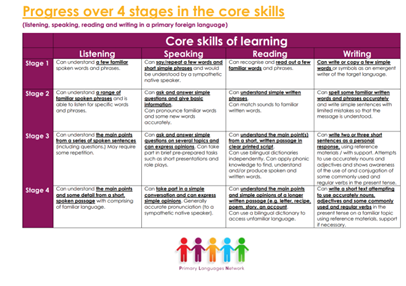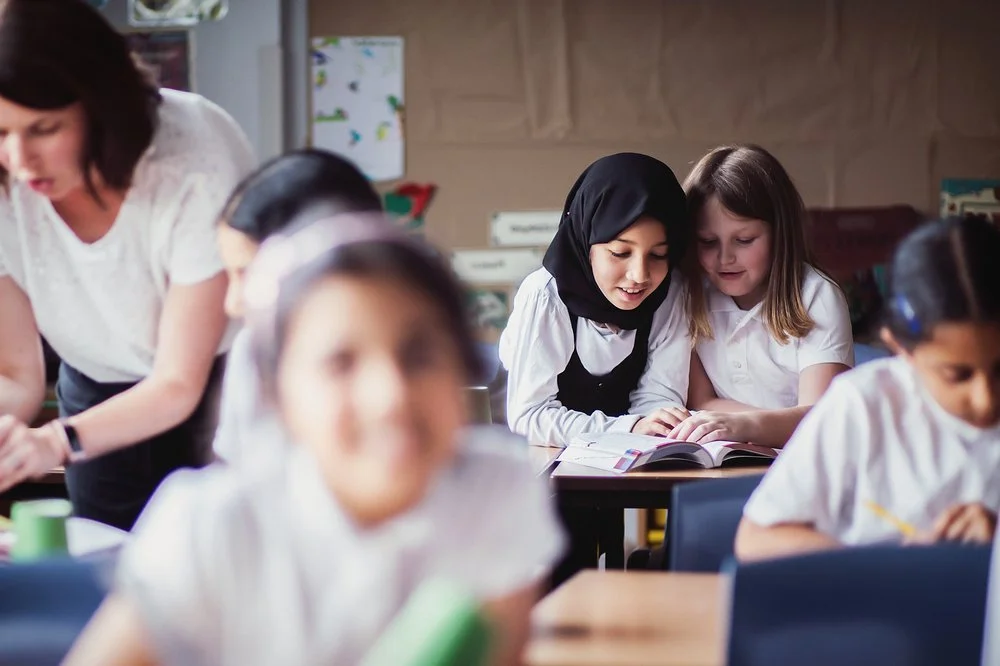Monitoring progress in Primary Language Learning
How can I evidence progress?
Let's start by understanding how progress can be measured in primary languages. It makes sense to start with the four key skills learning document. The key word here is four, a reminder that as a class teacher, you must ensure that your classes are practicing all skills: listening, speaking, reading and writing.
What does progress look like from lesson to lesson
One point worth noting is that each new topic will usually start with learning new words or phrases before being expected to form full sentences at the end of that topic. Here are some examples of progress made between lessons with stage 2 learners of French and Spanish in different schools.
Stage 2 Summer 1 Spanish, Walking through the Jungle.
You can see progress from lesson to lesson here. If we look back at the core skills document, we can see that the learner here has progressed from individual words in lesson 1 to "write simple sentences with limited mistakes so the message is understood".
Work from St Michael’s Catholic Primary School in Widnes
Similarly, this French piece of work in lesson 1 uses a gap fill template then moves on to writing several sentences in lesson 2.
Work from Weston Primary School
Do I need to have work in books every lesson to show progress?
Absolutely not! At Primary Languages Network we believe that the work in books should be a 'celebration' of writing and other work done in lessons. Every other week or every three weeks is certainly enough. Writing doesn't always have to be done in books and instead could be done on whiteboards; this is particularly helpful to build confidence before doing work in books. This work could then be photographed and saved in a folder on your VLE secure locker or even printed and stuck into books. Written work could also be done using the ‘magic pen’ and air writing activities.
How can I show the bigger picture of progress?
When the children start learning the language at stage 1 (usually year 3), we advise making sure books are big enough to be used over two years or longer, from year 3 through to year 4 and from year 5 through to year 6. Some schools use one book all the way through. In terms of evidencing progress, the biggest indicator to show progression is how the core skills develop from stages 1 through to stage 4. If we take a look at the core skills of learning document for writing, a book should clearly show at the beginning of the book in stage one that learners can ‘copy or write a few simple words’ then the following academic year there should be examples of work showing that the child ‘can spell some familiar written words and phrases accurately and write simple sentences with limited mistakes’. If work is kept in one book, even between stages 1 and 2 the progress should be clear to see even to an outside visitor.
Do I need to use books with KS1 classes to show evidence?
Exercise books do not tend to be used in KS1 languages. Folders can be used to keep pieces of work that the children have completed or some schools opt for the big floor books which are often used for subjects such as PSHE or RE. In KS1 a lot of the focus is on using songs, games and stories. If you are using a floor book, a nice idea to evidence the speaking skill is to use your class iPad or phone to take videos and create a QR code to stick in the floor book.
What about evidencing progress in speaking?
An iPad is your best friend for this. Record your class doing speaking activities and save it to your school drive or the secure locker folder on the Primary Language Network VLE. Another way to evidence speaking progress would be to celebrate their speaking work on Twitter. Create a hashtag specific for MFL Tweets at your school, for example #Schoolname_MFL. This automatically will keep a record of speaking activities and should demonstrate progress made over time.
Gathering evidence of speaking activities can be lots of fun. Why not try using apps like the Chatterpix app for recording speaking? I did this with a class working at stage 2 with the alien family topic. The children drew a picture, then using the Chatterpix app, they took a photo of the picture then recorded a message. The app then turned the picture into a speaking picture with a moving mouth, so much fun!
Are there end of unit tests?
The Puzzle it out tasks can be completed at the end of each half-term or each term as evidence to stick in books. At the bottom of the series of lessons on click to teach you will find a button for the Puzzle it out task for that half term.
Is there a tracking tool?
At Primary Languages Network we have created a tracking tool for you. On the VLE we have a spreadsheet to input grades for the puzzle it out task and this will monitor progress for you, both on an individual level and a class level. It also shows performance in each skill so you can monitor where the class as a whole may need more focus in the future. To access the assessment spreadsheet, go to your Coordinator tools. Download them and you are ready to go!
Coordinator Tools >Tracking and assessment > Assessment spreadsheets > Download assessment spreadsheet
Lisa Ormes
Associate Primary Languages Teacher
Lisa Ormes is an associate language teacher at PLN specialising in Spanish and has worked with us for the last four years across a number of schools. Lisa has a wealth of teaching experience including secondary and sixth form as well as English as a Foreign Language in Spain and Japan. She is passionate about helping our young learners to become independent language detectives whilst developing a love for languages.






